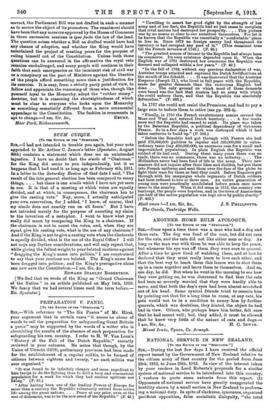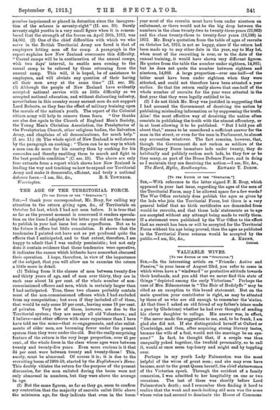NATIONAL SERVICE IN NEW ZEALAND.
[To THE EDITOR OF TEE "SPECTATOR."] SIR,—During the last few days I have received the official report issued by the Government of New Zealand relative to the citizen army of that country for the period from June 28th, 1912, to June 20th, 1913. In view of the interest taken by your readers in Lord Roberts's proposals for a similar system of national service to be introduced into this country, I venture to quote some extracts from this report. (1) Opponents of national service have greatly exaggerated the hostility shown by a small section in New Zealand to perform- ing a national duty. In spite of slackness, ignorance, organized pacificist opposition, false socialistic disloyalty, "the total
number imprisoned or placed in detention since the inaugura- tion of the scheme is seventy-eight" (II. sec. 30). Surely seventy-eight youths is a very small figure when it is remem- bered that the strength of the forces on April 30th, 1913, was 54,062. (2) One of the chief difficulties with which we who serve in the British Territorial Army are faced is that of employers letting men off for camp. A paragraph in the report explains how New Zealand overcomes this difficulty. " Casual camps will be in continuation of the annual camps, with two days' interval, to enable men coming to the casual camp to be relieved by those returning from the annual camp. This will, it is hoped, be of assistance to employers, and will obviate any question of their having all their men away at the same time " (II. sec. 26). (3) Although the people of New Zealand have evidently accepted national service with as little difficulty as we accepted national education, and without dislocating industry, nevertheless in this country many earnest men do not support Lord Roberts, as they fear the effect of military training upon the morals of the nation's youth. The report of the Colonial citizen army will help to remove these fears. " Our thanks are also due again to the Church of England Men's Society, the Young Men's Christian Association, the Presbyteries of the Presbyterian Church, other religious bodies, the Salvation Army, and chaplains of all denominations, for much help."
(I. sec. 11.) (4) The whole spirit of New Zealand is well shown by the paragraph on cooking : " There can be no way in which a man can do more for his country than by cooking for his comrades and thereby enabling them to march and fight in the best possible condition" (C. sec. 15). The above are only four extracts from a report which shows how New Zealand is leading the way and teaching us how to expand our Territorial Army and make it democratic, efficient, and truly a national
Warrington.







































 Previous page
Previous page